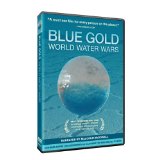| Reviews & Columns |
|
Reviews DVD TV on DVD Blu-ray 4K UHD International DVDs In Theaters Reviews by Studio Video Games Features Collector Series DVDs Easter Egg Database Interviews DVD Talk Radio Feature Articles Columns Anime Talk DVD Savant Horror DVDs The M.O.D. Squad Art House HD Talk Silent DVD
|
DVD Talk Forum |
|
|
| Resources |
|
DVD Price Search Customer Service #'s RCE Info Links |
|
Columns
|
|
|
Blue Gold: World Water Wars
Blue Gold: World Water Wars isn't some weird late-breaking sequel to Waterworld, it's a documentary. Wrangling with an under-the-radar, hot-button topic, this look at something most would rather ignore is by turns gripping, tragic, and yes, even a bit soggy. Those who've seen Quantum of Solace have been drearily indoctrinated in this too real yet sometimes dry subject, but for this documentary, smoothly constructed and with arresting narration by Malcolm McDowell, the result is an easy to absorb, must-see effort.
Blue Gold is divided into three narrative sections, and crafted from standard documentary ingredients: interviews, archival and contemporary footage, and compelling graphics. Its point is simple; we've a finite amount of water and an ever-growing population. Sucking viewers in most dramatically, McDowell relates a true story focusing on the effects of seven days in a desert without water. The result is horrific. It's a grandstand move, but it certainly makes clear this subject's importance. Then taking us back to grade school, filmmaker Sam Bozzo begins to explode our myths of a constantly renewing aqueous resource. It's not so simple anymore, he explains, while we're also taken on a tragic tour of the Third World, and the decrepit condition of the water supply there.
Though made as plain as possible, it gets a little tricky delivering the hows and whys of our dwindling supply of potable water. Essentially, we're removing the stuff from the water table faster than it's being replenished. Additionally, we're polluting the heck out of it, and rerouting it to all the wrong places - mostly industry. It's a huge problem, but not intractable, however, governments don't seem particularly interested in creating solutions. A more insidious element on this frontier comes in the form of duplicitous multinational corporations buying water rights from Third World countries and selling the commodity back to the impoverished at exorbitant prices. It's enough to make you think the human race is insane, but that's just my opinion. At any rate, after a slate of harrowing, soul-crushing statistics and images of desperate people scrapping for mere drops of polluted water, water rights and lawsuits tend to dry up proceedings a bit. (It was a weakness of Quantum of Solace, too. Sometimes the truth, no matter how dire, just isn't sexy.)
But Bozzo employs every trick in the documentary book to ultimately craft a gripping, easy-to-comprehend look into the abyss. McDowell provides plenty of drama, most statistics are brutally simple, (for instance, only 3% of the world's water is freshwater, and much of that is polluted) and stylish CGI brings many concepts to an elegant level of visual understanding. CGI globules of water in particular are used to show scale; how much water is used in manufacturing a microchip, for example. Bozzo's assured, slick bluntness absolutely does what it has to, but it's likely the rare viewer who won't be thoroughly depressed or casually dismissive (a skill at which Americans have become quite adept lately) by the end of the movie. To climb up on a soapbox, I'd like to recommend everyone who reads this to check out this documentary, or do some research of their own, and take some form of action - even if it's just turning off the tap when you shave. With no political agenda other than conservation, Bozzo makes it clear that this is a problem that's becoming more acute daily. We'll feel it soon, our children will feel it, and so on, if we don't begin to change our view of what is after all the source of life.
The DVD
Video:
A non-anamorphic widescreen image is a disappointment, making this best viewed in a letterboxed 4 x 3 ratio. No love for the widescreen TV (which uses too much electricity anyway). The image is adequate, with understated color, generally average levels of detail and some aliasing. As a PBS DVD, this looks like it is meant for standard definition broadcast TV.
Sound:
Dolby 2.0 Stereo Audio makes the grade, with clear, undistorted fidelity, and good balance between the sometimes minimalist, Phillip Glass-esque score, and other audio elements.
Extras:
The documentary Trailer and 17 minutes of Deleted Scenes (that add depth, and were mostly removed to get the movie down to a lean 90 minutes) comprise the first two extras. A nine-minute Filmmaker Interview comes from a cheesy morning talk-news show, Urban Rush, out of Vancouver BC. The typically blithe, goofy and ingratiating hosts do, however, manage to deliver well-thought-out questions to Bozzo and producer Mark Achbar (The Corporation).
Final Thoughts:
Blue Gold delivers with hard-hitting information presented dynamically and in easy to comprehend terms. It's not a fun subject, and all the more important to learn about for that fact. As one interviewee mentions, he almost wishes we'd run out of oil already so we can deal with the real problem. Despite an underwhelming video presentation, Blue Gold is a captivating documentary and should be required viewing. From a philosophical standpoint, it's highly recommended, as DVD product it certainly merits a Recommended rating.
www.kurtdahlke.com
|
| Popular Reviews |
| Sponsored Links |
|
|
| Sponsored Links |
|
|
| Release List | Reviews | Shop | Newsletter | Forum | DVD Giveaways | Blu-Ray | Advertise |
|
Copyright 2024 DVDTalk.com All Rights Reserved. Legal Info, Privacy Policy, Terms of Use,
Manage Preferences,
Your Privacy Choices | |||||||













